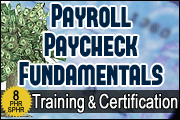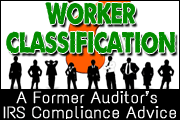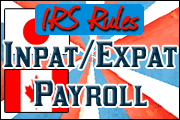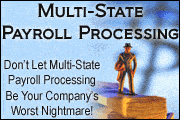Payroll Paycheck Training

Learn Proper Procedures For Handling Paychecks!
Someone new to payroll might think that payroll is simply sending out a paycheck. Wrong!
First, you must know the laws, starting with the Fair Labor Standards Act (FLSA), which regulates minimum wage, overtime pay, recordkeeping, and youth employment standards affecting employees in the private sector and in federal, state, and local governments.
Under these regulations, covered non-exempt workers are entitled to a specific minimum wage, plus overtime pay, if applicable, at a rate not less than one and a half times the regular rate of pay. There also are specific rules for tipped workers, regulations re "child labor", and laws for final or unclaimed paychecks.
Next, you have multiple pieces of information that you must collect, manage, and safeguard, including tax information, work hours, pay rates, deductions, vacation time, and benefits. Only then can you attempt to pay your employees!
But handling payroll is more than just distributing pay. "Payroll" starts with
properly classifying your workers, knowing how to handle
garnishments,
Fringe Benefits, and
work visas, as well as how to comply with state-specific rules for
final and unclaimed paychecks and
multi-state taxation.
All this does not include the
operational side of payroll, which involves the processing and retention of
I-9s, preventing fraud,
avoiding penalties,
completing required reports on a timely basis, and following complex rules for
documentation and recordkeeping. Got all that?
Don't worry, TrainingCenter offers numerous payroll training courses to cover everything you need to know to handle payroll accurately and legally. To help, below is information and links to training courses for handling the payroll and paycheck process.
What Are The Common Errors Of Payroll Paycheck Processing?
Common errors in payroll paycheck processing can occur due to various reasons, including human error, outdated systems, or inadequate training. Some of the most prevalent errors include:
- Incorrect Data Entry:

Typos or mistakes when entering hours worked, wages, deductions, or other payroll-related information can lead to incorrect paychecks. - Overtime Calculation Errors:
Failing to accurately calculate overtime pay based on federal, state, or local regulations can result in underpayment or overpayment of employees. - Misclassification of Employees:
Misclassifying employees as independent contractors or vice versa can result in incorrect tax withholding, leading to compliance issues with tax authorities. - Failure to Accurately Account for Deductions and Benefits:
Forgetting to include deductions such as taxes, insurance premiums, retirement contributions, or other benefits can result in inaccurate paychecks. - Tax Calculation Errors:
Errors in calculating federal, state, and local taxes can lead to underpayment or overpayment of taxes, resulting in compliance issues and potential penalties. - Ignoring Or Not Handling Wage Garnishments or Court Orders Correctly:
Failing to withhold and remit wage garnishments or court-ordered payments can lead to legal consequences for the employer. - Overlooking Paid Time Off (PTO) Accruals:
Failing to accurately track and account for PTO accruals and usage can result in discrepancies in employee pay. - Missed Deadlines:
Missing deadlines for payroll processing, tax filings, or other compliance requirements can lead to penalties or fines. - Inadequate Documentation:
Poor record-keeping practices can lead to difficulties in auditing payroll processes and resolving discrepancies.
To mitigate these errors, organizations should invest in proper payroll training, implement robust payroll software systems, regularly review and reconcile payroll records, and stay informed about relevant tax laws and regulations. Additionally, having multiple layers of review and oversight can help catch and correct errors before paychecks are issued.
Recommended Payroll Paycheck Training Courses
>>> Paycheck Fundamentals Training & Certification ProgramThe Paycheck Fundamentals Training &Certification Program helps beginning and intermediate HR professionals learn the basic payroll requirements. Our Paycheck Fundamentals training course will teach you to properly:

- Identify, pay, and withhold taxes for employees
- Follow reporting and taxation requirements for tips
- Calculate supplemental wages
- Track deferred compensation, Cafeteria Plan, and other deductions
- Handle stock options, expense reimbursements, relocation, and other 'expenses'
- Calculate, deduct, and report Federal Income Tax withholding and FUTA taxes
- Handle garnishments, back-pay, sick pay, bonuses, awards, and gifts
- Understand 'Totalization Agreements'
- Make federal tax deposits
- Follow documentation and recordkeeping requirements
Details / Order:https://www.payrolltrainingcenter.com/paycheck-fundamentals-training-and-certification-program-ot1000061
>>> Worker Classification
During this training session, you will learn how to properly identify, use, and pay Independent Contractors to prevent costly worker-classification audits. Specifically, you and/or your team will learn:
- The factors used to determine if an employment relationship exists
- What the IRS and states consider a bona fide independent contractor
- What the auditing agencies are focusing on
- How to determine the scope and potential areas of focus for your audit
- How to identify any areas of concern prior to an external audit or an audit by another group within your company
- Common areas where mistakes or issues can normally be found
- How a review can help you detect internal control issues
Details / Order:https://www.payrolltrainingcenter.com/independent-consultant-or-employee-a-payroll-auditor-s-advice-for-irs-compliance-wt1000387
>>> GarnishmentsBy attending this training session you will learn:

- State and federal law regarding garnishments
- How to determine how much to withhold for child support
- The priority of garnishment orders - yes, some people get more than one!
- Recent legislation challenges such as lump sum reporting for child support orders
- Discussion of legally allowed Child Support fees - and how to administer
- Review of EIWO and the benefits
- How to properly calculate applicable earnings (Ex: Disposable earnings, take home pay)
- The process for terminated employees that have garnishment orders
- How to keep up with changing legislation
- Other garnishment processing best practices
Details / Order:https://www.payrolltrainingcenter.com/garnishments-child-support-orders-and-other-levies-wt1001704
>>> Fringe Benefits
Benefits ot attending this training session include:
- Which benefits are taxable - and how they should be reported
- Which benefits are excludable from taxes - and how they should be documented
- How to compute the value of a "good" versus a "service" - and how to handle the payroll tax consequences for those items considered taxable
- How to perform your own internal review to catch anything that may actually cause an audit
- What the IRS guidelines are for an employment tax audit
- What to do if you have some items that should have been considered wages subject to payroll taxation
Details / Order:https://www.payrolltrainingcenter.com/compliance-tips-for-gifts-awards-and-other-fringe-benefits-wt1000333
>>> Work VisasThere are several different types of Visas that organizations use to have non-US based workers perform services in the United States. And depending upon the type of Visa, the process for international taxation on their payroll varies.
This training course will help you understand the documents that should be kept for your international assignments to taxation and accounting for international employees. Other key learning objectives include:

- Concepts on how to handle different employer tax policies for international assignments, including "Tax Equalization" and "Tax Protection"
- Best Practices for administering a Tax Equalization Program
- Accounting for Tax Equalization
- Overview of Non-Resident work Visas - and to handle them
- Understand Student Visas and how they impact how you pay your employees
- What documentation employers should have and keep for all international assignments
- Explanation of Tax Treaty and Totalization agreements
- Review of the foreign earned income and housing exclusions
- Details of the IRS Bona Fide Residence test and the Physical Presence test and its impacts on tax calculations
Detailed discussion on why it is critical for HR and payroll to work together on all international assignments
Details / Order:https://www.payrolltrainingcenter.com/taxation-for-international-payroll-wt1000386
>>> Final / Unclaimed PaychecksThis training session will review the laws of all 50 states with regards to unclaimed wages. By attending this training session you will learn:
- The definitions of unclaimed properties and escheat law

- The difference between tangible and intangible property that can go unclaimed
- State-by-state reporting and remitting requirements
- State-by-state review of dormancy period laws and due diligence requirements
- The difference between reporting and remitting
- Payroll Department's role and responsibilities for unclaimed property
- What types companies are at higher risk of an audit
- Record retention requirements by state
- Best practices for unclaimed paychecks
Details / Order:https://www.payrolltrainingcenter.com/requirements-for-unclaimed-paychecks-wt1000338
>>> Multi-State PayrollThis audio conference will help you to know the taxation and reporting requirements for all states where your organization has employees working - or in some cases - living. By attending, you will learn:
- How to determine "resident" and "non-resident" status - and how they affect the taxation process
- What are the state income tax withholding rules for workers who live in one state and perform services in another

- what nexus and domiciled means - and how it affects tax
- Where is the employee subject to state unemployment insurance
- How reciprocal agreements affect taxation of wages
- The four factor test for state unemployment insurance
- Which states require the use of their own Withholding Allowance Certificate, which states allow either theirs or the Form W-4, and which states don't have a form
- How the 4 part test works - and how all states are supposed to implement this test
- What is done in practice when a worker travels to multiple locations - Are multiple W2's issued? Are employees provided with personal tax assistance? What about tax equalization on a state to state basis?
- What does your payroll system allow or what is your functionality around multistate workers
Details / Order:https://www.payrolltrainingcenter.com/multi-state-payroll-tax-compliance-wt1000334
Find Payroll Paycheck Training Options
For additional training options for handling payroll paychecks, either go to
https://www.payrolltrainingcenter.com/payroll-training-topics or use the search box below.
Find Seminars, Webinars, And Online Training In Your Area











